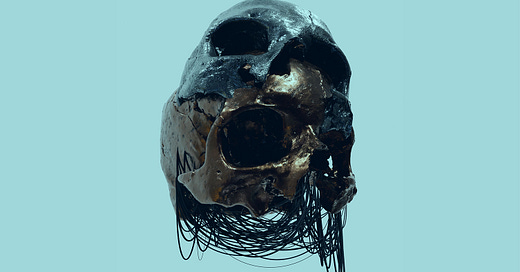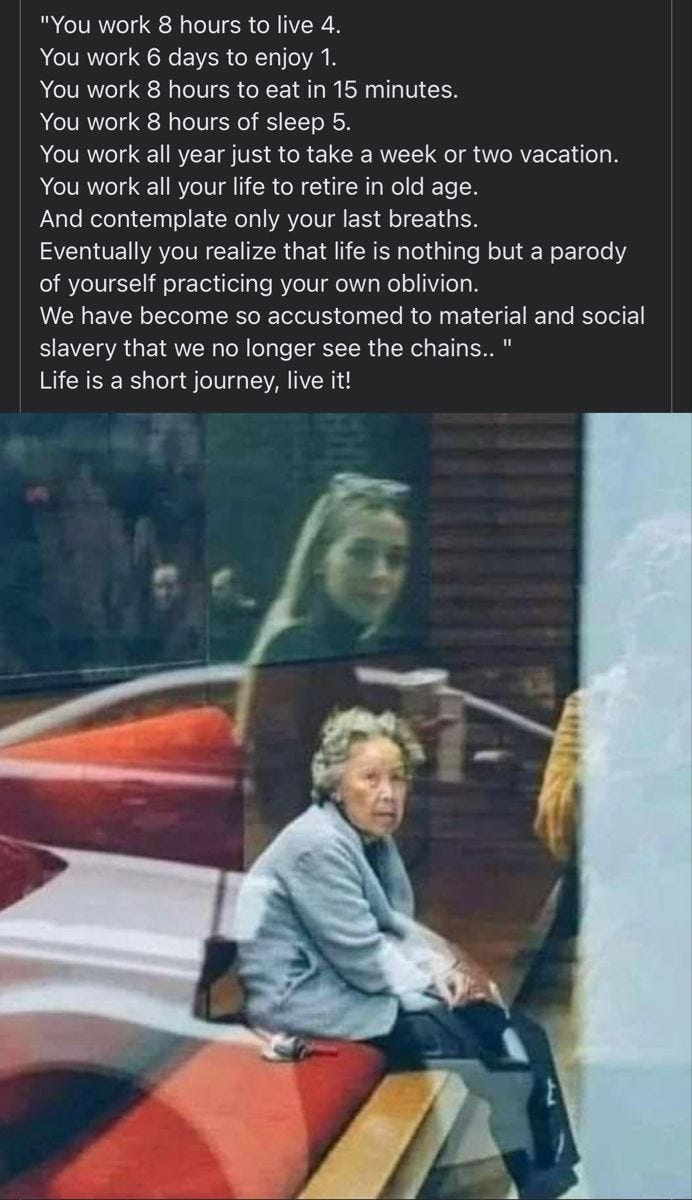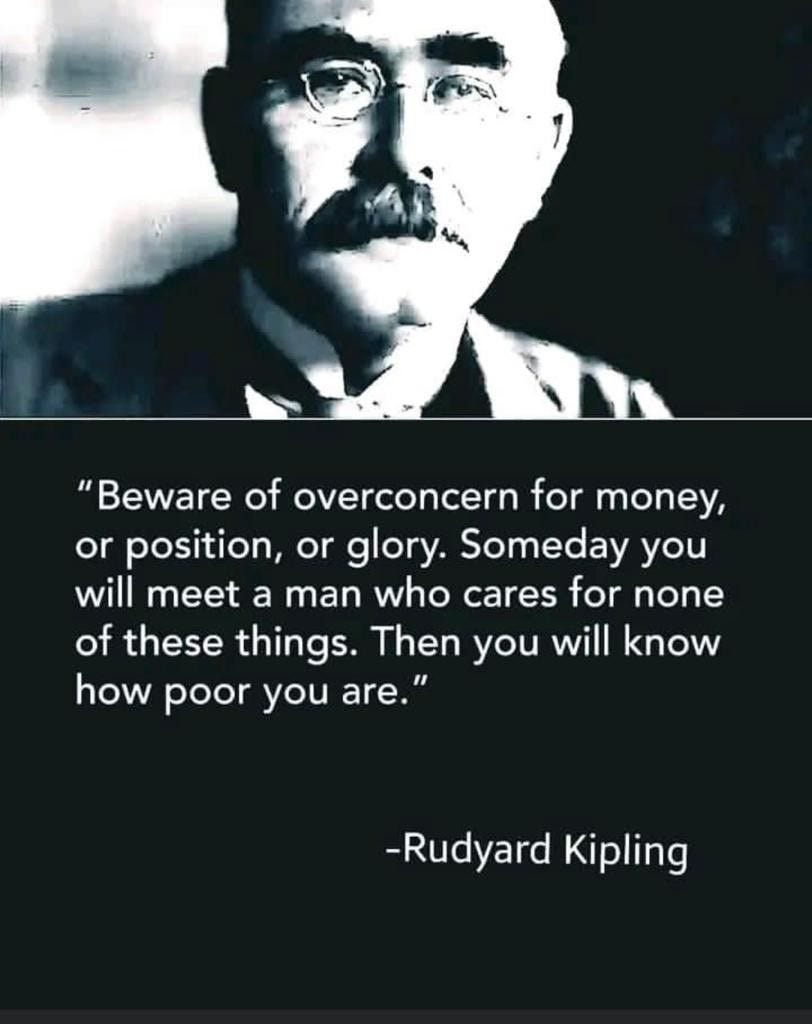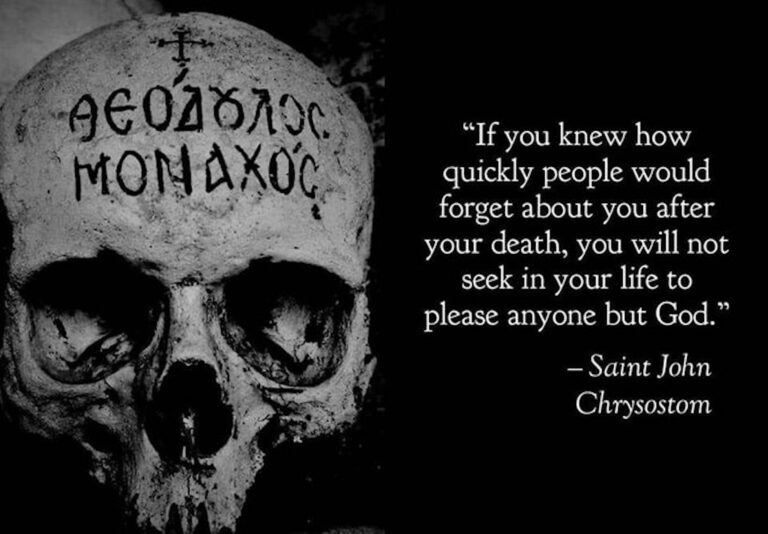The purpose of life is a glorious death
Awareness of death can cultivate a better, more relevant life.
Death comes to us all. Most fear it and virtually everyone avoids discussing their own end despite knowing it must arrive one day.
This is understandable. Who wants to dwell on the end? It feels morbid. That kind of thing is just for the suicidal, those who welcome death.
And yet some attention on the inevitability of our own demise can help us refocus when life goes awry. When it stops making sense sometimes the best thing you can do is remember the party doesn’t go on forever.
Assessment starts there, with a deathbed lens to really sort out the wheat from the colossal pile of chaff that overwhelms even the best of us. Reminding ourselves of our inevitable end can help align us with what really matters in life since much of it doesn’t.
One of the most consistent regrets of the dying is that they lived the wrong life. More specifically, they lived a life chosen by others. A career to impress parents or embracing a path approved by society while they slowly died inside.
Many of us live like this. We drift into existential culdesacs then struggle to summon up the courage to make changes we know are necessary to escape. We rationalize our inertia; it is the wrong time, the economy is shaky, it is too risky. Maybe I’ll get to it one day, but now is not the right time.
However, as the dying can tell us the most dangerous strategy is avoiding the deep sense of wrongness many feel about their lives. It is sending us a message that we ought to consider making changes.
What shines through from accounts of those on the final path to death is the unwelcome clarity it brings them. All the artifice we use to shore up our poor choices, or our avoidance of making any choices, is finally stripped away. By necessity it is a time of reflection for those who know the end is near. By then there is nothing left but reflection since the road ahead does not exist and the falsehoods of their own life are laid bare. What was the point of it all?
As bleak as the subject is, it provides an opportunity for us to consider our own life. We are not at death’s door but we can hijack some of its brutal finality for the life we have yet to live.
The deathbed lens
There is a saying, sometimes attributed to Confucius, that we have two lives. The second begins when we realize we only have one.
This aims to jolt us from complacency to recognize our personal timeline does not go on forever. We only get a single life and we are living it now.
Many professionals who tend to the terminally ill such as palliative care nurses find themselves acting as confessors to the near dead. Stripped of the debilitating protection of the need to maintain a false image as they face oblivion even the grandest feel compelled to get it all off their chest, often resurrecting ambitions and dreams from a lifetime past.
The finality of death is the supreme leveller, the ultimate ego bulldozer able to obliterate the social acts we disguise ourselves with throughout our lives.
It is easy to imagine the horror of this. When the end is near the facade is hardly worth maintaining as the end-of-life carers learn. From the great and the good to the nobodys, they are forced to confront it all at the end.
We can use the finality of death as a lens with which to assess our own lives, something the actual near-dead probably wish they themselves had done earlier.
What this lens really does is attempt to artificially induce the self-awareness so often reported by the dying. No more self-lies, no more acting. Getting right to the heart of it.
Contemplating our own final end can bring some of this shock to our system. Your life is the sum total of the many decisions you make. At some point long before death many of those decisions are still to be made. They are ahead of you and you can make different ones. This is the deathbed lens. Its imaginative use forces some of the honesty we need to help us objectively assess where we are and where we want to go.
The goal is to imagine the bitter end. Full immersion to confront the absolute finality of this life terminating forever.
What will you really care about? What will seem superfluous? What will strike you as nonsense? What do you have in your life you imagine will seem unimportant at the end? What are you not doing that you really ought to be?
Although simple in principle things are different in practice. Really thinking through our death is upsetting. What does it do for us to explore this depressing idea?
The goal is not to wallow in the thought of dying, but to use it as a shock to the system. The brief flare of lucidity it can induce is often useful to shine a light on all that we are. From there we can begin to assess what matters, or what we think will matter at the end. We can begin to define what is relevant.
Recalibrate for relevance
People avoid thinking of their own death for a reason. The horrifying reality the party goes on without us. All of it tainted by the awareness few of us are living the life we really want.
If you look through the lens of your deathbed you have a mechanism to decide what matters. What will you actually care about at that stage?
All the petty stuff will not even register. The daily news you know is manipulated to maximize anxiety. The dead end job, the fear of making mistakes. Everything you feel is nonsense but captures your mind nonetheless.
A meaningful life is about alignment. Spending as much of your life aligning to what you want. Demanding it by stripping out the nonsense, annihilating the hangups holding you back like fear, the wrong attitude, pessimism, learned helplessness or the judgment of others. All of it can be overcome. Or, rather, it can be more objectively assessed. The bitter end helps you better understand all the lies your subconscious mind conjures up to keep you well within a comfort zone where nothing happens.
The best life is filled with relevance. At the end the accumulation of those relevant things is the goal. Plenty of them and fewer irrelevant things.
This is an active process of pruning. Target and remove the unwanted things cluttering life. Learn to spot them, understand they can be removed, then take steps to excise them from life. Unhealthy relationships, poor work conditions, no space to do creative work because of meaningless commitments. All can be looked at anew through the deathbed lens. They will feel like time and opportunity wasted by then. So don’t waste them. Make a point of not wasting them now by actively removing them wherever possible.
Equally important is to identify what is actually relevant to the life you would prefer to live. Relationships you don’t maintain, neglected career aspirations, grander ambitions to satisfy deeper needs such as writing or other creative pursuits.
Most know their life is a combination of irrelevance as well as absent elements that touch our souls. All these are choices we can re-examine in the aftershock of the deathbed lens.
The goal is to attempt an analysis minus the fog of contemporary noise we all live with. To scrutinize with more precision than normal. To imagine the near-dead version of yourself finally stripped of fear and the opinions of others, unconcerned about status, money or mindless consumption. Laid bare, forced to confront the finiteness of life. Imagining running out of time then travelling back to now to make some course changes. To prioritize the relevant.
Focus on what you can control
The one great contribution made by ancient stoic philosophers was the observation that a good life focused on what you can control and rejected that which could not be controlled.
In the modern world we tend to focus more on what we cannot control. Twenty-four hour news media and the internet bombard us with nonstop information beyond our own sphere of influence. Distant wars, threats of societal collapse, questionable predictions about complex systems like weather or economies. Little of it has relevance to us, yet it can be skilfully scripted to induce fear and panic, convincing us to pay attention.
The ancient stoics lived in a more sedate world yet they understood the human tendency to pay attention to novel sources of information. We are especially primed for fear. We naturally attend to any unfamiliar event that triggers anxiety. In our evolutionary past that could be the appearance of a large dangerous animal or even a freak weather event. Attending to novelty could save your life.
The stoics emphasized the need to train ourselves to tune out these peripheral events to better focus our minds on something more important, namely things we can actually control in our lives. It is this element most miss about stoicism, the need to identify and then embrace that which lies within our influence. Our diets, our social circle, our ability to choose high quality sources of information rather than becoming the passive recipients of someone else’s choices. Reading a book you’ve had to discover, purchase and consciously make time to read is different from sitting slumped on a couch as a documentary plays on TV.
The stoics made a virtue of discerning between these things, that which you can control and that which you cannot. The good life didn’t just tune out nonsense it made a point of making the most of what can enhance life in practical ways. A useful philosophy in today’s saturated media landscape with dopamine frazzled billions conjoined with powerful digital devices designed to keep us hooked.
This basic binary choice, deciding what we cannot control and reducing its sway over our lives, and determining what we can control and doing more of it, gets to the essence of the deathbed lens. It provides a convenient heuristic to try to make sense of what might be important when we reach the end. Do more of the stuff you can directly do, actively remove that which has little bearing on your life.
There is another famous quote that often sends a chill down our spines, especially in this era of omnidistraction. They say you die twice; once when you shrug off the mortal coil and a second time when God introduces you to the person you could have been.
That second person, who will no doubt be leaner and fitter, happier and more content, more accomplished and perhaps even with a touch of wisdom. A horrifying thought. All we could become if only we tried.
To become that contented person with accomplishments is a truly glorious death. The kind of person who meets the end not just with a sense of satisfaction, but knowing deep down they did it all. Or perhaps just did more of what actually mattered. Crucial to this we must assume is an awareness of cutting out as much mindless crap as possible. We already understand no one lies on their deathbed and wishes they had spent more time at the office or watching TV. Yet we also know both can dominate our best years.
In more recent times the list has grown. Social media outrage, lunatics protesting faddish nonsense you don’t care about, or mentally ill people insisting their avoidance of reality is some new reality you must endorse.
Some events do affect us of course, but how much attention are they really worth? Will we care at the end? Will we even remember them? It is this judgment we must hone through practice, learning to discriminate all that surrounds us to extract the signal and discard the noise.
The deathbed lens reminds us life is finite. You don’t live forever. If you are ever going to write the novel, start the business or get the girl, you had better get started. For many of our deepest ambitions, the ones that resonate with our soul, the time and focus needed to tackle them can be purchased by pruning the irrelevant. The mindless news or the doomscrolling that eats into our precious time. The scramble for dopamine hits exacerbating a fog of indecision easily filled with television serials and unplanned YouTube expeditions that obliterate a whole evening. These things can destroy our lives if we let them.
Life is a complex word, often used in positive ways to capture vitality and energy. A better word to really drive home the concept is existence. We have a single existence, and if we are not careful we will squander it. At some level we all understand we are using up our unique existence one minute at a time.
Thinking about our own death can periodically remind us we only have this single personal timeline. It slips away while we distract ourselves and one day it comes to an abrupt end. We know from others that the impending finality of this is what provides the clarity so often damaged by our casual addictions and quests for novelty.
Every second counts. Intensity matters. Like physical discomfort hard effort is soon forgotten, despite being off-putting on the way in. Contemplating our own death reminds us to not squander our gift of life, to discipline ourselves to focus on what we will care about when it finally ends.
Even the act of reminding ourselves of the bitter end does much to refocus our energies. It reminds us we make choices all the time, and we can make better ones if we want. And if we really push the boat out we may find the purpose of our life is to pack it full of things, people and activities that actually matter. We can aim for a glorious death, and maybe that is all a good life is in the end.
You may also enjoy this…













I'm reminded of quote by Charles Bukowski: "Can you remember who you were before the world told you who you should be?" It's unfortunate that so many can't remember; they lose themselves in the expectations of others or of society. I don't mean obligations; that's different, but you can keep your self intact and keep your obligations. As a recovered alcoholic much of drinking arose from a feeling of being trapped in a life I abhorred without an escape. Once I realized that I could be true to myself and still meet my obligations, that I could separate the things I had committed to from the things that I was guilted in to doing, my recovery finally took hold and I lost that obsession to drink. But it's so hard to see that. I don't know if I make any sense there but your essay got me thinking about this.
Damn, that picture looks like someone who didn't look away at the end of "Raiders of the Lost Ark!"
Excellent piece. Not an easy subject to cover, but you did it very elegantly.